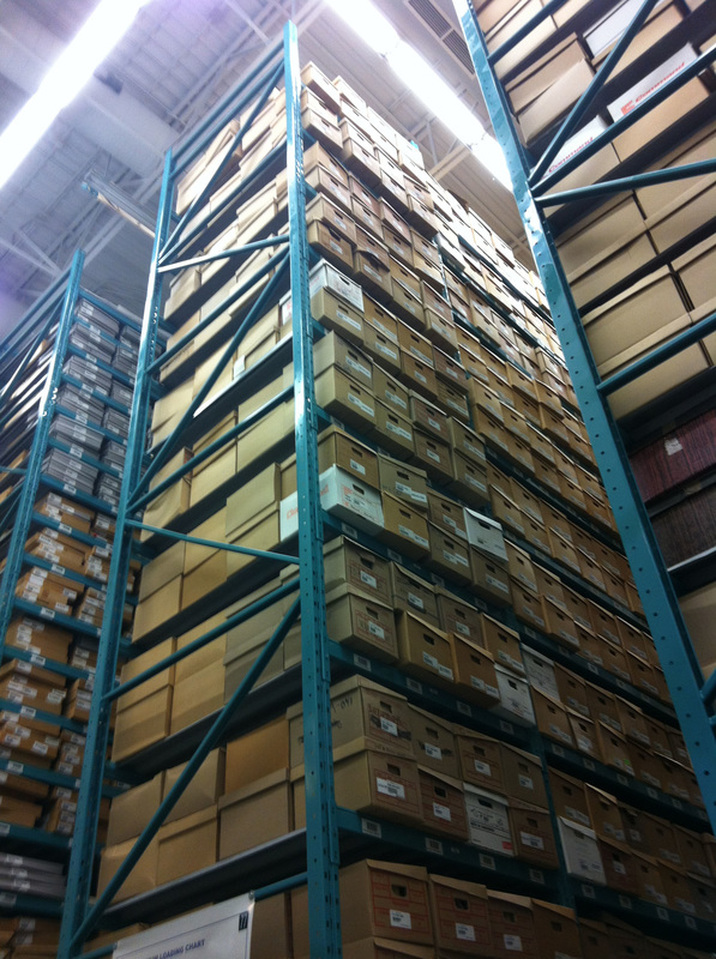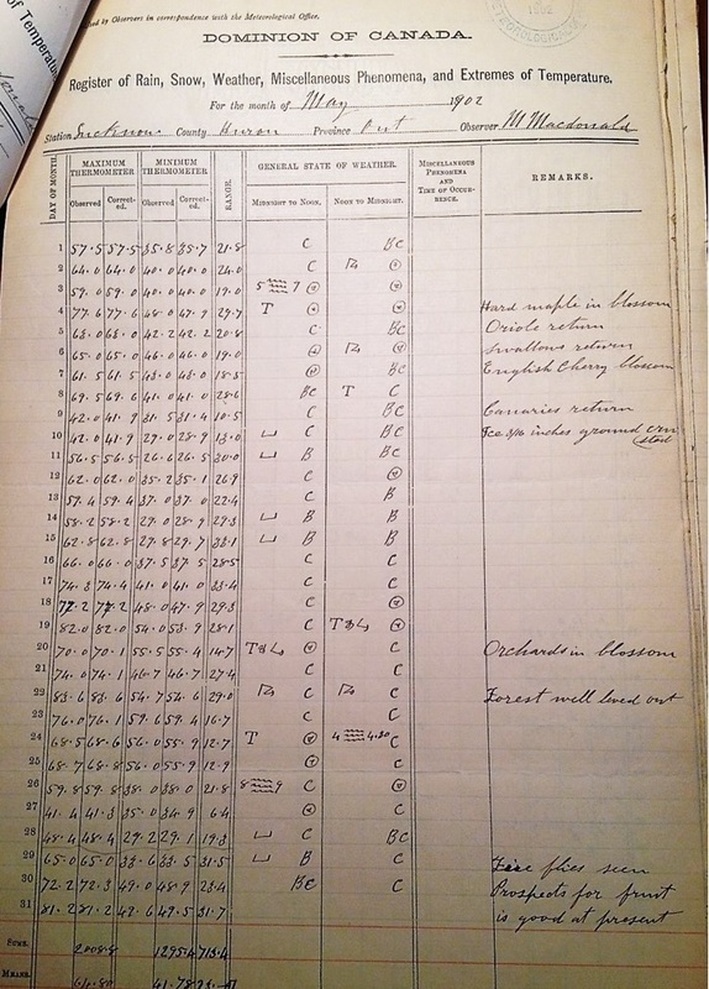|
Dr. Alan MacEachern, University of Western Ontario. Western's Archives and Research Collections Centre (ARCC) storage room. Photo by Gabrielle Bossy. In 2008, I had a meeting at the Environment Canada headquarters in Downsview, Ontario, and afterward staff gave me a tour. Since I’m a historian, they showed me the old stuff. Down in the basement – not quite the warehouse scene at the end of Raiders of the Lost Ark, but close enough – they led me along row after row of weather observations: all of the original paper forms and registers that since 1840 had been filled out by what would eventually be thousands of observers at thousands of weather stations across Canada. Environment Canada had long ago squeezed the quantitative data they wanted from the observations, and from it created an online National Climate Data and Information Archive. That may have actually put the physical collection more at risk; a teary librarian told of worrying she would return from vacation someday and find it had been thrown out. Staff were maintaining the collection as best they could, but they knew the facility was not up to archival standards – a massive steam pipe loomed menacingly nearby – and they were concerned about the lack of a long-term plan for it. The collection should rightly have gone to Library and Archives Canada (LAC), but in earlier decades the archives had expressed no interest in it and more recently had experienced an acquisitions freeze. So without any real plan, let alone authorization, I offered to take the collection off Environment Canada’s hands. Environment Canada weather stations, 1840-1960. Visualization by Josh MacFadyen, Arizona State University. At the time, I was a dyed-in-the-wool environmental historian increasingly feeling that I had somehow neglected the most pressing environmental issue of our time, climate change. Helping protect a nationally-significant climate history collection seemed like good karma. I went straight from Environment Canada to my university archives. Thankfully, a few years earlier the archives had moved into a new building containing a high density module capable of holding one million volumes. Thankfully, too, University Archivist Robin Keirstead was excited by the idea of having the collection come to Western University, so it could be better preserved, more accessible to researchers, and made available for teaching purposes. Robin and I formally contacted Environment Canada and LAC, expressing Western’s interest in receiving the collection. It took years of negotiation, but what ultimately made the transfer happen was that some folks at Environment Canada thought these old records were priceless and others thought they were worthless, so both concluded it would be great if they were at Western. In 2014, the collection arrived at Western on long-term loan – here is a full listing of it. There are several hundred volumes of correspondence, letterbooks, and journals related to Canadian meteorological and climatological history between 1828 and 1967. But the real jewels of the collection are the almost 900 archival boxes (an estimated 1.6 million pages) containing all of Environment Canada’s extant daily weather observations between 1840 and 1960. From what we could determine, this was the largest archival arrangement ever made between a Canadian university and the federal government. Mission accomplished. …But now what? “Super salubrious.” Howard D. Sloat, Jarvis, Ontario, August 1954, EC151, Environment Canada collection. This was already a good news story as far as I was concerned, because the Environment Canada collection will be protected at archival standards indefinitely (presumably, until LAC is in a position to take it). But now that it was at my university, I wanted to see it used. I advertised its availability to researchers across Canada. I developed a climate history course that utilized it. And I considered what contributions neophyte climate history researchers – like my students, like me – could make with it. To begin, we are focusing on the qualitative remarks that observers included alongside their quantitative data. Although Environment Canada long encouraged (or, in some eras, tolerated) observers’ remarks on such matters as extreme weather, farming conditions, and changing seasons, it had never figured out a way to utilize these remarks, including in its climate archive. This qualitative data remained untapped. Students and I are working to change that. In the past year, we have begun creating a database of remarks from the collection. We are transcribing everything the observers thought worth observing (with the important exception that we are ignoring the hundreds of thousands of entries such as “Clear,” “Fair,” or “Rain”). There are many entries on crop conditions and the status of harvests, on smoke from forest fires, on Northern lights, on matters of local political or social interest. There are also many entries that offer insights into the history of the meteorological service itself. “Hard maple in blossom. Oriole return. Swallows return. English Cherry blossom. Canaries return. Ice 3/16 inches ground. Orchards in blossom. Forest well leaved out. Fire flies seen. Crops all look well except corn it is yellow with the cold and wet.” Malcolm McDonald, Lucknow, Ontario, May 1902, EC172, Environment Canada collection. But of special interest – both to the observers and to us – is phenological information. Phenology is the study of cyclical natural phenomena, and weather observers documented, often over the course of decades, the dates of ice break-up and freeze-up on rivers and lakes, when the first of various bird species appeared, when wildflowers bloomed, when spring peepers emerged. The observers were especially vigilant during what might be called the “phenological moment” of the late 19th and early 20th century, when Canadian individuals and learned societies became intent in gathering such information as a means of gaining biological and meteorological knowledge about their nation. With historians and climate scientists today seeking to verify older meteorological observations and to understand other ways of knowing climate, these observations assume new significance.
The database that Western History students and I are creating already has tens of thousands of tagged entries. In the near future, we will shift to the creation of a website that allows for geographical, temporal, and thematic searching of these observations, at micro- to macro- scales. Interested in Ajax, Ontario or in all of Canada? In your birthday or in a fifty-year timespan? In reports on earthquakes, orioles, or lilacs, or on all extreme weather, all fauna, all flora? We certainly hope to use this for research purposes, but our project’s ultimate goal is to make these observations available to climate researchers, and to the public, so that they make findings of their own. More good karma – climate research requires it. Contact me at [email protected] if you have questions about the Environment Canada collection or research access to it. ~Alan MacEachern 5/16/2016 03:15:22 pm
Fabulous! Thank you so much Alan for this important work of preservation. We must link these data to census & parish register data someday, at the lowest spatial unit possible. Wouldn't it be neat to see if temperatures correlate with infant deaths, for example? If good growing seasons correlate with marriage intensity? (For individual years and for specific places) ...
Alan MacEachern
5/20/2016 02:12:14 am
Thanks, Lisa. I'd stress that a great deal of this collection's _quantitative_ data is already online, & ripe for just the sort of plucking you suggest. See http://climate.weather.gc.ca/historical_data/search_historic_data_e.html
John D Reid
6/21/2016 09:01:40 am
As a retired meteorologist living in Ottawa I have a slight regret that LAC failed to live up to their mandate in taking this collection. I'd previously used the Director's letter books when they were in Downsview and now will have to travel that much further to consult them -- something those outside Ottawa wanting to use LAC resources understand all too well.
Alan MacEachern
11/1/2016 08:59:11 am
The collection is in good hands, John -- & I don't mean mine, I mean those of the archivists at Western Archives. But I agree with you, the collection should eventually end up at LAC (...where it will be hard for out-of-Ottawa researchers to access, unless it's digitized).
It is also known as a main house and tanmak as a business house serving as a restaurant and inn. Comments are closed.
|
Archives
March 2022
Categories
All
|




 RSS Feed
RSS Feed